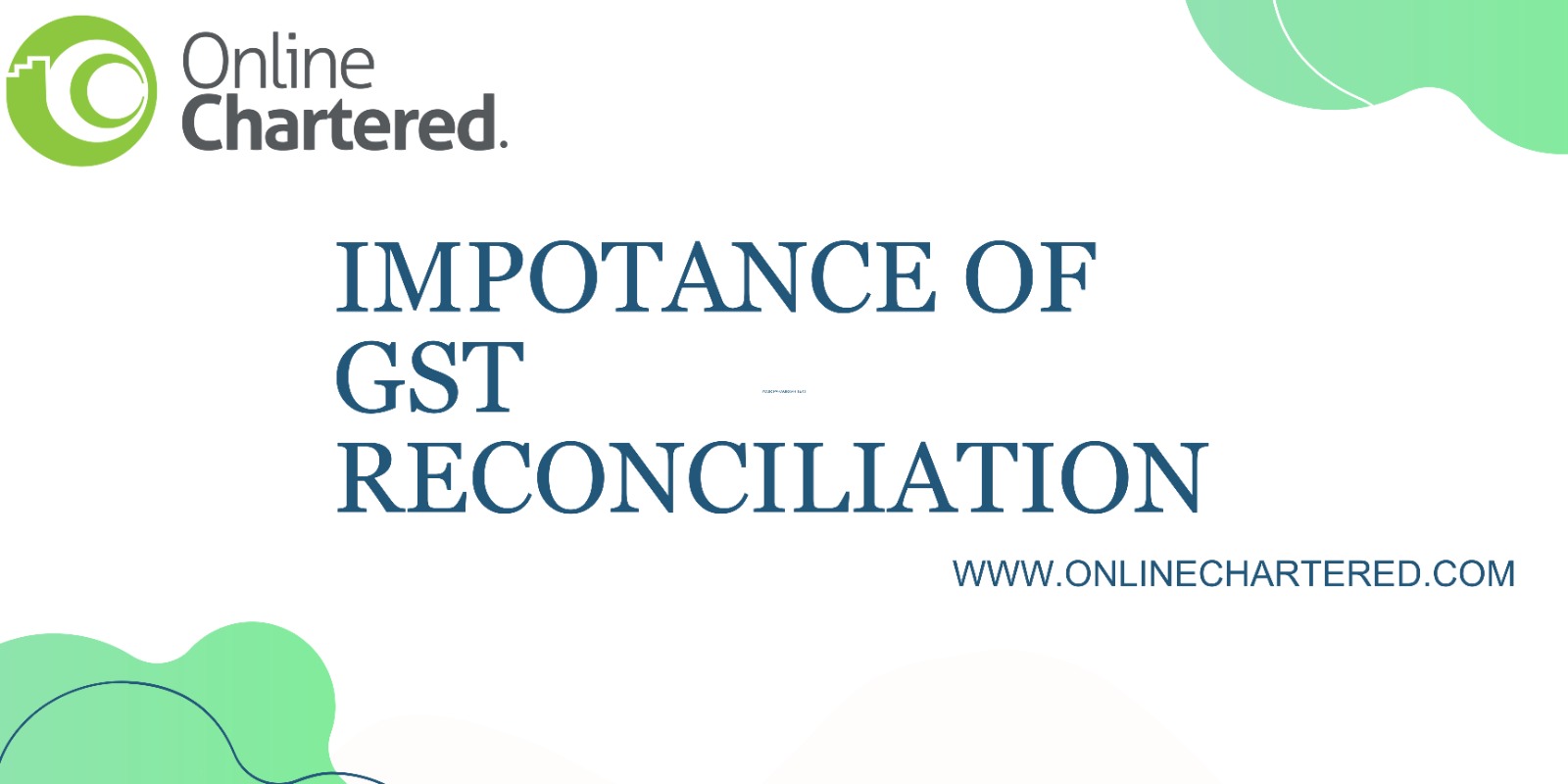GST reconciliation: Significant Importance

Introduction: GST reconciliation
Reconciliation plays a vital role in maintaining accurate financial records and ensuring compliance with various tax regulations. Under the Goods and Services Tax (GST) regime, businesses are required to reconcile their data periodically to match their internal records with the information submitted to tax authorities. This article explores why reconciliation is crucial under GST and the benefits it offers businesses.
Why GST reconciliation is important?
A reconciliation of accounts with GST and Income tax is required to find out the discrepancy in the various aspects reported under both the statutes i.e. GST and Income tax. Reconciliation involves cross-verifying and reconciling the data reported in a business’s financial books with the information filed in GST returns. It helps ensure accuracy, detect discrepancies, and maintain transparency in tax compliance. Any major discrepancy if detected by tax authorities may lead to legal litigations which ultimately leads to the wastage of time and other resources of an individual. In this article, we will see why it is so important to always reconcile the data maintained as books of accounts with that of the income tax and GST so that accurate tax planning can be executed:
Importance of Reconciling Credit Under GST:
- Ensuring accuracy and transparency in tax reporting: reconciling credits helps businesses validate the accuracy of their tax calculations, ensuring that the credits claimed to match the actual taxes paid. It promotes transparency in tax reporting and reduces the chances of errors, miscalculations, or discrepancies.
- Preventing double taxation or loss of credit: Failure to reconcile credit can lead to double taxation, where businesses may end up paying tax twice on the same transaction. Reconciliation helps identify and rectify such instances promptly, avoiding financial losses and ensuring that credits are not lost.
- Complying with legal requirements and avoiding penalties Reconciliation is a legal requirement under the GST. Non-compliance or negligence in credit reconciliation can attract penalties, fines, and legal consequences. By reconciling credit regularly, businesses stay compliant with the law and mitigate the risks associated with non-compliance.
- Facilitating smooth business operations and cash flow: Effective credit reconciliation ensures that the input tax credits are accurately accounted for, reducing the chances of discrepancies between books of accounts and GST returns. This, in turn, facilitates smooth business operations and helps maintain a healthy cash flow.
- Building trust and credibility with tax authorities: Proper credit reconciliation demonstrates a business’s commitment to compliance and accuracy in tax matters. It helps build trust and credibility with tax authorities, which can be beneficial in the case of audits, inquiries, or any other interactions with tax authorities.
Benefits of Effective Credit Reconciliation:
Effective credit reconciliation offers several benefits to businesses:
- Maximizing utilization of input tax credits (ITC): By reconciling credits, businesses can identify and claim their rightful input tax credits, maximizing their utilization. This reduces the tax burden and improves cash flow.
- Minimizing tax liabilities and optimizing cash flow: Accurate reconciliation helps minimize tax liabilities by ensuring that only eligible credits are claimed. This leads to better cash flow management for businesses.
- Avoiding tax disputes and minimizing audit risks: Proper credit reconciliation reduces the chances of tax disputes, inquiries, or audits. By maintaining accurate records and reconciling credits, businesses can mitigate risks and build a strong defense in case of any tax-related issues.
- Streamlining compliance and reducing operational costs: Reconciliation ensures compliance with GST regulations, reducing the chances of penalties or fines. It also streamlines the overall tax compliance process, saving time and operational costs for businesses.
- Gaining insights into business performance and efficiency: Reconciliation provides valuable insights into a business’s financial transactions. By analyzing reconciliation reports, businesses can identify areas for improvement, optimize processes, and enhance overall efficiency.
- Reconciliation procedures: By aligning the financial records with the data submitted in GST returns. It ensures that businesses are correctly reporting their transactions, maintaining proper documentation, and complying with GST regulations.
- Simplifying Audits and Assessments: Reconciliation plays a crucial role during audits and assessments conducted by tax authorities. By having accurate and reconciled data, businesses can provide the necessary supporting documents and explanations, making the audit process smoother and less time-consuming.
- Minimizing Tax Evasion and Fraud: Reconciliation acts as a deterrent to tax evasion and fraud. By comparing the reported data with their financial records, businesses can identify any potential misuse or manipulation of tax information. This helps maintain the integrity of the GST system and reduce tax evasion.
Challenges in Reconciliation Under GST
1. Complex Tax Structure
The complex tax structure under GST, involving multiple tax rates and categories, can pose challenges for businesses during the reconciliation process. Businesses need to ensure accurate classification and calculation of taxes to reconcile their data effectively.
2. Voluminous Data Handling
GST involves handling vast amounts of data related to sales, purchases, input tax credits, and more. Managing and reconciling this data manually can be time-consuming and prone to errors. Utilizing automation tools and software can help overcome this challenge.
3. Technical and System-related Issues
Technical and system-related issues, such as compatibility between different software systems or data migration problems, can hinder the reconciliation process. Businesses must address such issues promptly and ensure seamless data exchange for effective reconciliation.
Conclusion
GST reconciliation is a crucial process for businesses to ensure accurate tax reporting and compliance with GST regulations. By reconciling the data provided in different GST returns, businesses can identify discrepancies, rectify errors, and avoid penalties or audits. Implementing best practices, leveraging tools and techniques, and seeking professional assistance when needed can contribute to efficient and effective GST reconciliation. Therefore, it is always better to consult a certified accountant expert for GST compliance. We at Online Chartered provide easy access to accurate and timely GST filing with expert advice.
FAQs
1. What is the significance of GST reconciliation?
GST reconciliation is significant as it ensures the accuracy of tax reporting, identifies discrepancies, and helps businesses avoid penalties or audits by tax authorities.
2. How often should businesses perform GST reconciliation?
Ideally, businesses should perform GST reconciliation regularly, such as monthly or quarterly, to minimize the chances of errors going unnoticed.
3. Can GST reconciliation be done manually?
Yes, GST reconciliation can be done manually by meticulously comparing the data provided in different GST returns. However, automated reconciliation software can streamline the process for businesses dealing with large volumes of data.
4. What are the challenges in GST reconciliation?
Challenges in GST reconciliation include the complexity of the tax structure, managing large volumes of data, and keeping up with frequent changes in tax laws.
5. How often should businesses reconcile their GST data?
Businesses should reconcile their GST data periodically, ideally on a monthly or quarterly basis. Regular reconciliation helps identify discrepancies and errors early on, allowing businesses to rectify them promptly and maintain accurate records.
6. Can reconciliation help in identifying input tax credit (ITC) mismatches?
Yes, reconciliation can help identify input tax credit (ITC) mismatches. By reconciling their purchase data with the corresponding entries in GST returns, businesses can identify any discrepancies in ITC claims and rectify them to ensure accurate tax credit utilization.
7. Is reconciliation mandatory under GST?
While reconciliation is not explicitly mandated under the GST, it is highly recommended for businesses. Reconciliation helps ensure accurate tax compliance, minimize errors, and maintain transparency in financial transactions. It is a best practice that businesses should adopt to avoid potential compliance issues.
You may also like this:
